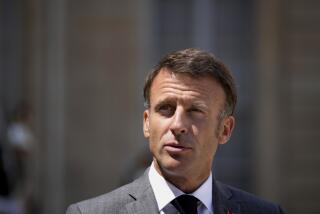Bosnia Warned That U.N. Troops Will Leave if War Goes On : Balkans: World body’s military commander in war-torn republic has quit in frustration.
- Share via
VIENNA — European Union mediator Lord Owen warned at the start of peace talks here Tuesday that U.N. troops will be pulled out of Bosnia-Herzegovina unless the bloodletting ceases--a threat underscored by disclosure that the U.N. commander in Bosnia has resigned in frustration.
Lt. Gen. Francis Briquemont asked a month ago to be relieved of his duties, the Belgian Defense Ministry said in Brussels on Tuesday in confirming his imminent departure.
Last week Briquemont lambasted the U.N. Security Council for passing grandiose resolutions while failing to provide the military muscle to enforce them.
His complaints echoed those of French Gen. Jean Cot, who is in charge of the entire 26,000-strong U.N. Protection Force mired in the Balkans and has been increasingly resentful of what many see as Mission Impossible.
Announcement of Briquemont’s decision to leave his post came as Bosnian and Croatian leaders met here for the latest attempt at negotiation.
The talks between Bosnian Prime Minister Haris Silajdzic and Croatian Foreign Minister Mate Granic adjourned without any reported breakthrough but were expected to resume today.
The meeting was mediated by Owen and his U.N. partner in the roving peace talks, Thorvald Stoltenberg, in hopes of calming one of the two most vicious conflicts in Bosnia prior to the Jan. 18 resumption of negotiations in Geneva that will tackle the larger offensive, that of the Bosnian Serbs.
Sarajevo, the Bosnian capital, continued to suffer an intensive artillery pounding by Serbian rebels, with at least nine civilians killed by the shelling after 15 fatalities Monday.
In central Bosnia, forces of the Muslim-led government have been engaged in a bloody struggle with Bosnian Croats for control of the vital Lasva River valley, which both sides want as part of their ministates being carved out of shattered Bosnia.
Owen was apparently seeking to step up pressure on the Muslims and Croats when he threatened during a British radio interview to remove U.N. forces from Bosnia deployed to escort lifesaving aid to virtually all of the population.
Some diplomats from the European Union (formerly the European Community) have complained that the humanitarian mission is keeping the battles alive, as well as the civilians.
Owen and Stoltenberg have brought the combatants near to a negotiated settlement twice over the past four months, only to see agreement collapse as one side or another balked at a last-minute concession.
Silajdzic and Granic have proclaimed themselves in agreement on basic issues after past negotiations, but both have failed to compel some elements of their armed forces to abide by calls to resume joint efforts to withstand the Bosnian Serb sieges.
“I do not think we have the right to fail any more,” Silajdzic told reporters before his talks with Granic. But he conceded that the Croatian and Muslim populations are now deeply distrustful of each other.
Both government and Croatian forces are feeling pressured by this week’s change of EU leadership to agree to the formula for ethnic division endorsed by Owen and Stoltenberg. It would grant about half of Bosnia to the Serbs, one-third to the government, 17% to the Croats and put Sarajevo under U.N. administration.
Greece has assumed the rotating EU presidency, raising fears it will work in favor of its closest Balkan allies, the Serbs.
More to Read
Sign up for Essential California
The most important California stories and recommendations in your inbox every morning.
You may occasionally receive promotional content from the Los Angeles Times.













